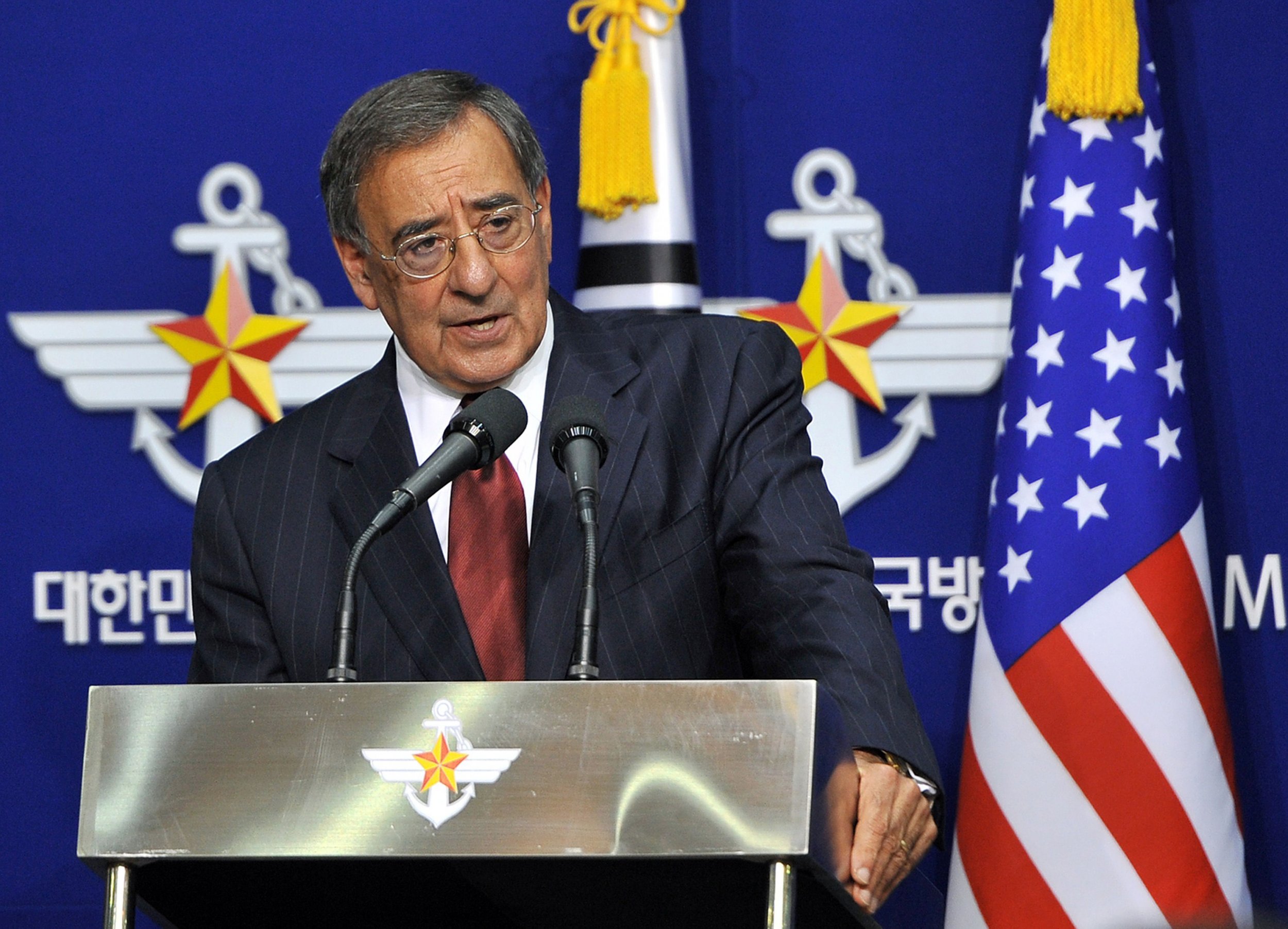
The specter of nuclear mushroom clouds rising over northeast Asia has long been a staple of nightmare scenarios in the event of another war between North and South Korea. It's a prospect so apocalyptic that American officials have rarely articulated exactly what would trigger their use of weapons that could instantly kill millions and make the entire peninsula uninhabitable for decades.
In a memoir published last week, however, former CIA chief and Defense Secretary Leon Panetta reopened the prickly issue, recalling a chilling, 2010 briefing in Seoul by General Walter L. "Skip" Sharp, the commander of U.S. forces in South Korea, who told him just such a nightmare could come true should communist forces pour across the DMZ as they did in 1950.
"If North Korea moved across the border, our war plans called for the senior American general on the peninsula to take command of all U.S. and South Korea forces and defend South Korea— including by the use of nuclear weapons, if necessary," Panetta writes in "Worthy Fights: A Memoir of Leadership in War and Peace."
"I left our meeting with the powerful sense that war in that region was neither hypothetical nor remote," Panetta wrote, 'but ever-present and imminent."
Reaction to Panetta's remarks ranged from shrugs to astonishment that he would so breezily raise the prospect of a nuclear apocalypse. Some experts called Panetta's pronouncement on U.S. policy unrealistic – and even dangerously misleading. "Typical wooden-headedness on the part of a U.S. official," a former top CIA expert on Korea called Panetta's recollection. "How in the world do we think South Koreans will react to the news that the U.S. is prepared to use nuclear weapons on the peninsula? It doesn't reassure them, only makes them think having the U.S. bull in their china shop is maybe not such a good idea," the former official added on condition of anonymity in exchange for discussing such a sensitive issue. "It also doesn't really scare the North Koreans, who think they have been under a nuclear threat for decades – which is why they developed their own nuclear program."
But this is not exactly news, Terence Roehrig, a Korea expert at the Naval War College, told Newsweek. A U.S-South Korea "Joint Vision" statement signed by Presidents Obama and Lee Myung-bak in 2009, he pointed out, "references extended deterrence to include the nuclear umbrella." Indeed, "in many respects, the information is not new," Roehrig told Newsweek. "The United States has long had a position that South Korea was under the U.S. nuclear umbrella."

Likewise, Richard Fisher, a senior fellow at the non-partisan International Assessment and Strategy Center in Washington, D.C., said American officials have "likely" discussed the first use of nuclear weapons privately with South Korea and Japan through the years. But he was surprised to see Panetta's remarks, telling Newsweek, "it is rare to have this recounted publicly by such a recently serving former senior official."
Washington's policy on using nuclear weapons to deter a North Korean invasion could be likened to Israel's position of "studied ambiguity" on its atomic stockpiles – or just official confusion, judging from the reaction to Panetta's remarks. Although the U.S. first deployed tactical nukes to the peninsula in 1958, American officials shied from affirming their presence until the mid-1970s, when U.S. forces were routed in Vietnam and Seoul threatened to develop its own deterrent should U.S. troops depart. Even though President George H.W. Bush began withdrawing nuclear weapons from South Korean soil and U.S. ships off the peninsula in 1991 – a process continued in 2010 when President Barack Obama retired them from submarines as well – U.S.-South Korean communiques over the years have cited "extended [nuclear] deterrence" from afar as policy.
But arms control specialist Jeffrey Lewis dismissed the prospect of the U.S. ever resorting to nuclear weapons to obliterate North Korea. "We [are] simply telling the South Koreans what they want to hear," said Lewis, director of the East Asia Nonproliferation Program at the Monterey Institute of International Studies, of Panetta's tale. "But the reality is that the United States wouldn't use nuclear weapons against North Korea any more than it did against Iraq."
South Korea knows this, Lewis maintains. "The problem with placing a misleading emphasis on nuclear weapons [that] we never plan to use is the rhetoric comes back to haunt us when South Korean politicians argue that Seoul should build a bomb," he told Newsweek.
Constantly framing the issue in terms of a potential North Korean invasion is also misleading, says Roehrig, director of the Naval War College's Asia-Pacific Studies Group. Despite Pyongyang's persistent, bellicose threats, it "is highly unlikely to attack in a [1950s] Korean War-style invasion across the DMZ," he said, "because the military balance is against North Korea and attacking in that manner would be tantamount to regime suicide…
"That is not to say the North does not have significant military capabilities and would not cause tremendous damage and loss of life," Roehrig added, "but it would lose."
Whatever actual U.S. policy is, he said, "strategic deterrence of a full-scale invasion is strong and there is little likelihood North Korea would embark on such an operation."
Uncommon Knowledge
Newsweek is committed to challenging conventional wisdom and finding connections in the search for common ground.
Newsweek is committed to challenging conventional wisdom and finding connections in the search for common ground.
About the writer
Lauren is a reporter covering technology, national security and foreign affairs. She has previously worked on award winning teams at ... Read more
To read how Newsweek uses AI as a newsroom tool, Click here.








